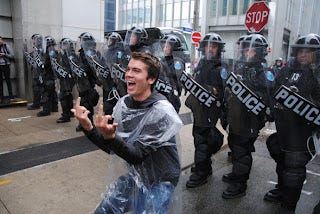Flipping off police officers is Constitutional.

A federal appeals court has reinstated a civil rights lawsuit by a Vietnam veteran who contends he was wrongfully arrested after expressing his displeasure with a radar speed trap by extending his middle finger.
The New York-based 2nd U.S. Circuit Court of Appeals said the "ancient gesture of insult" displayed by former airline pilot John Swartz did not justify the traffic stop. Swartz, a Vietnam veteran living in St. Johnsville, N.Y., was riding in a car driven by the woman he later married when he flipped the bird in the May 2006 incident. The New York Times and the Albany Times Union have stories on the decision (PDF).
The 14-page opinion, written by Judge Jon O. Newman for a three-judge panel, expressed skepticism at the officer’s explanation of why he had followed the car.
"Perhaps there is a police officer somewhere who would interpret an automobile passenger’s giving him the finger as a signal of distress, creating a suspicion that something occurring in the automobile warranted investigation. And perhaps that interpretation is what prompted Insogna to act, as he claims. But the nearly universal recognition that this gesture is an insult deprives such an interpretation of reasonableness. This ancient gesture of insult is not the basis for a reasonable suspicion of a traffic violation or impending criminal activity. Surely no passenger planning some wrongful conduct toward another occupant of an automobile would call attention to himself by giving the finger to a police officer."
In the paper, he writes: “The pursuit of criminal sanctions for use of the middle finger infringes on First Amendment rights, violates fundamental principles of criminal justice, wastes valuable judicial resources, and defies good sense.”
Swartz says he was charged with disorderly conduct after he demanded to talk “man to man” to the officer who followed him, Richard Insogna. The officer says Swartz called him vulgar names; Swartz’s version of events differed, though he does say he expressed that he “felt like an ass.”
Insogna said in a deposition that he saw Swartz's gesture as an attempt to get his attention for some reason, and he followed the car to assure the safety of passenger and driver, who could be in a domestic dispute. The New York Times deems the officer’s interpretation “a curious instance of mistaken middle-fingered intent.” The 2nd Circuit was skeptical of the explanation.
"Surely no passenger planning some wrongful conduct toward another occupant of an automobile would call attention to himself by giving the finger to a police officer," the court said. "And if there might be an automobile passenger somewhere who will give the finger to a police officer as an ill-advised signal for help, it is far more consistent with all citizens' protection against improper police apprehension to leave that highly unlikely signal without a response than to lend judicial approval to the stopping of every vehicle from which a passenger makes that gesture."
“But the nearly universal recognition that this gesture is an insult deprives such an interpretation of reasonableness,” he added.
In the ruling, Judge Newman wrote that the act of “giving the finger” dated back centuries. He cited, for example, sources that trace the use of the gesture to ancient Greece, when it was used by Strepsiades to insult Aristotle and by Diogenes to insult Demosthenes.
The ruling also noted the work of Ira P. Robbins, a professor of criminal law at American University who has studied the history of the gesture and is the author of the article “Digitus Impudicus: The Middle Finger and the Law.”
http://www.huffingtonpost.com/2013/01/03/flip-off-police_n_2403563.html
http://www.wired.com/threatlevel/2013/01/flipping-off-cop-case/
Motorist who flipped off cop gets $50,000 from city.
http://www.onpointnews.com/NEWS/Motorist-Who-Flipped-off-Cop-Gets-$50000-From-City.html
Oregon man wins right to give police the finger.
http://www.foxnews.com/us/2010/11/02/oregon-man-wins-right-police-finger/?test=latestnews


